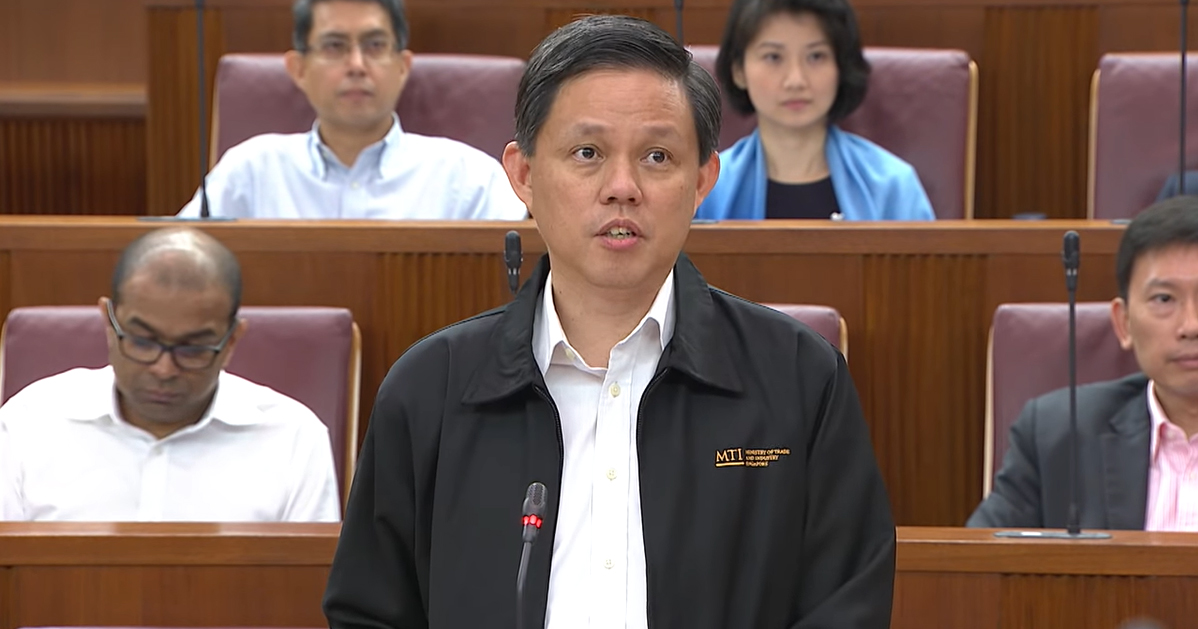Minister for Trade and Industry Chan Chun Sing on Tuesday, July 10 has reassured Singaporeans that the government is doing everything in its power to keep cost of living low.
Chan was responding to Liang Eng Hwa, MP for Holland-Bukit Timah GRC, who had asked whether the general cost of living in Singapore has increased significantly and is a cause for concern, and the measures the government will take to address further cost increases to minimise their impact.
Multidimensional issue
Chan said cost of living is a multi-dimensional issue.
The measure of how prices change over time is one aspect, while the gap between people's aspirations and their ability to fulfil them can also bring cost-of-living pressures to people.
Overall inflation rate lower
Chan said overall inflation rate has been lower between 2012 and 2017, compared with the corresponding period before.
The Consumer Price Index (CPI) inflation, or overall inflation, was at 0.6 percent a year on average for the past five years.
This was lower than the average of 4 percent between 2007 and 2012.
A faster pace of wage growth and improvements in the labour market is expected this year, which will help buffer against price increases.
Try to help everyone
“We try to help everyone in Singapore by making sure that those with the least get the most, but that doesn’t mean that those with more don’t get anything. It’s just a tiering of the help schemes that we have,” Chan said.
“For many of the middle-income... We try to do as much as we can to help their seniors, to relieve the burden of the middle-income households with elderly parents."
Chan also said: “We want to make sure that their children’s education remains affordable and everyone will have similar opportunities to excel and to fulfil their potential. Our promise as a government is, so long as someone is capable and committed, they should not need to have to worry about their means, their family circumstances. That’s why we give out as many scholarships, as many bursary awards as possible to help our students excel."
What can Singapore do on a macro and micro scale?
Here are some of the ways Chan said Singapore can manage cost of living pressures.
1. Keep economy competitive
At the macro level, to keep the economy competitive, the government will aim to establish the conditions for companies to create good jobs with sustained real income growth to outpace inflation.
In the long run, real wage growth is determined by the ability to raise productivity. Schemes such as the Productivity Solutions Grant aim to help companies do so, while other schemes such as the Special Employment Credit support employment opportunities for low-income and older Singaporeans.
The Workfare Income Supplement (WIS) Scheme helps low-wage workers supplement their incomes and build up their retirement savings.
2. Managing Singapore dollar
To preserve purchasing power, Singapore carefully manages reserves and the strength of our dollar to contain imported inflation.
The Monetary Authority of Singapore exchange rate-centred monetary policy helps to preserve our purchasing power. This is done through a gradual appreciation of the trade-weighted Singapore dollar in line with the economy’s underlying fundamentals.
3. Diversifying sources of supply
Diversifying our sources of supply, from food and water to fuel and raw materials for production, will ensure that Singapore is not held ransom by any source.
This bolsters the security and resilience of the resource supply chains, and avoid sharp price hikes when there are disruptions to primary sources.
4. Promoting Competition
Singaporeans get to enjoy competitive prices for comparable products when barriers to entry are lowered.
For example, the Energy Market Authority of Singapore has progressively opened up the electricity market to competition since 2001.
5. Managing the cost of doing business
To keep costs low, Singapore seeks to simplify processes and reduce business cost to minimise passing costs to consumers.
For instance, the government will ensure an adequate supply of residential, industrial and commercial space to relieve price and rental cost pressures as demand grows.
This is done to keep domestic sources of inflation contained, and continue to carefully manage domestic supply-side constraints.
Check out Chan's Facebook post for more:
[related_story]If you like what you read, follow us on Facebook, Instagram, Twitter and Telegram to get the latest updates.
